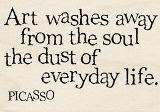
A Violinist in the Metro
A man sat at a Metro station in Washington DC and started to play the violin; it was a cold January morning. He played six Bach pieces for about 45 minutes.
During that time, since it was rush hour, it was calculated that thousands of people went through the station, most of them on their way to work.
Three minutes went by and a middle-aged man noticed there was a musician playing. He slowed his pace and stopped for a few seconds and then hurried up to meet his schedule.
A minute later, the violinist received his first dollar tip: a woman threw the money in the till and, without stopping, continued to walk.
A few minutes later, someone leaned against the wall to listen to him, but the man looked at his watch and started to walk again. Clearly he was late for work.
The one who paid the most attention was a 3-year-old boy. His mother tagged him along, hurried, but the kid stopped to look at the violinist. Finally the mother pushed hard and the child continued to walk, turning his head all the time.
This action was repeated by several other children. All the parents, without exception, forced their kids to move on.
In the 45 minutes the musician played, only 6 people stopped and stayed for a while. About 20 gave him money but continued to walk their normal pace. He collected $32. When he finished playing and silence took over, no one noticed it. No one applauded, nor was there any recognition.
No one knew this, but the violinist was Joshua Bell, one of the most renowned musicians in the world. He played one of the most intricate pieces ever written, with a violin worth 3.5 million dollars. Two days before his playing in the subway, Joshua Bell sold out at a theater in Boston where the seats average $100..
This is a real story. Joshua Bell playing incognito in the Metro station was organized by the Washington Post as part of a social experiment about perception, taste and priorities of people.
The outlines were: in a commonplace environment at an inappropriate hour, do we perceive beauty? Do we stop to appreciate it? Do we recognize talent in an unexpected context?
One of the possible conclusions from this experiment could be: If we do not have a moment to stop and listen to one of the best musicians in the world playing the best music ever written, how many other things are we missing?
A man sat at a Metro station in Washington DC and started to play the violin; it was a cold January morning. He played six Bach pieces for about 45 minutes.
During that time, since it was rush hour, it was calculated that thousands of people went through the station, most of them on their way to work.
Three minutes went by and a middle-aged man noticed there was a musician playing. He slowed his pace and stopped for a few seconds and then hurried up to meet his schedule.
A minute later, the violinist received his first dollar tip: a woman threw the money in the till and, without stopping, continued to walk.
A few minutes later, someone leaned against the wall to listen to him, but the man looked at his watch and started to walk again. Clearly he was late for work.
The one who paid the most attention was a 3-year-old boy. His mother tagged him along, hurried, but the kid stopped to look at the violinist. Finally the mother pushed hard and the child continued to walk, turning his head all the time.
This action was repeated by several other children. All the parents, without exception, forced their kids to move on.
In the 45 minutes the musician played, only 6 people stopped and stayed for a while. About 20 gave him money but continued to walk their normal pace. He collected $32. When he finished playing and silence took over, no one noticed it. No one applauded, nor was there any recognition.
No one knew this, but the violinist was Joshua Bell, one of the most renowned musicians in the world. He played one of the most intricate pieces ever written, with a violin worth 3.5 million dollars. Two days before his playing in the subway, Joshua Bell sold out at a theater in Boston where the seats average $100..
This is a real story. Joshua Bell playing incognito in the Metro station was organized by the Washington Post as part of a social experiment about perception, taste and priorities of people.
The outlines were: in a commonplace environment at an inappropriate hour, do we perceive beauty? Do we stop to appreciate it? Do we recognize talent in an unexpected context?
One of the possible conclusions from this experiment could be: If we do not have a moment to stop and listen to one of the best musicians in the world playing the best music ever written, how many other things are we missing?










An even harsher explanation could be that people probably thought he was just another hobo, albeit with a bigger talent than average.
ReplyDeleteAn interesting experiment. I would have to say that in general people are so absorbed with their lives and troubles that alot goes unnoticed, ignored.
ReplyDeleteThis will make me stop and think, pay a little more attention.
:)Leigh
That was an interesting experiment. On many different levels people stay in their own bubbles, especially in a city environment, thinking about work only. He would have been thought of as one of perhaps many musicians doing the same thing, and therefore not essential to one's interest. Society changes so much, but like evolution, it takes many years. Someday perhaps society will be different, and not so rushed and pressured for time. mark and salty
ReplyDelete